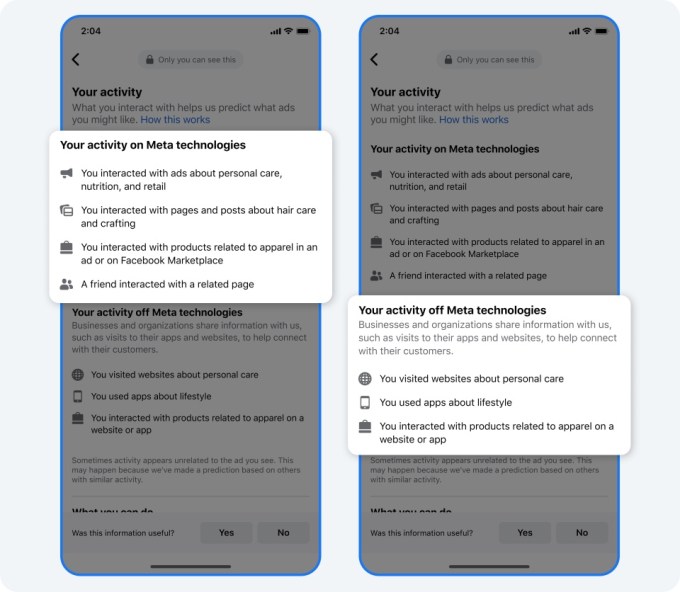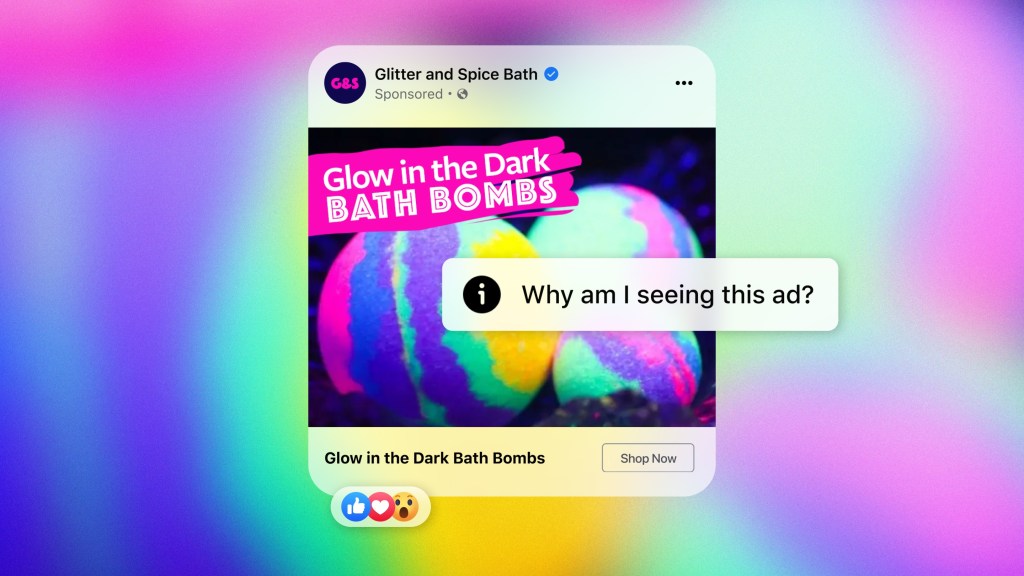Meta today announced it’s making changes to increase transparency around ads. The company says it’s updating a nearly decade-old Facebook feature “Why am I seeing this ad?” to better explain to consumers how an AI technique called machine learning may have played a role in the ad’s placement, among other factors. Specifically, it will now highlight how user activity both on and off Facebook may inform its machine learning models and it will detail how those models work to connect topics.
The company for years has fought off rumors that it’s listening to users’ conversations in order to target them with relevant ads. In reality, Facebook’s ability to precisely and eerily display ads about brands or businesses users had just been discussing offline is more likely the result of Meta’s highly developed ad technology that tracks users well beyond the Facebook app itself. But while this targeting has been effective, it’s also given Facebook a creepy image problem that’s convinced even the most rational users that Facebook has somehow found a way to listen to their conversations.
With the changes to the “Why am I seeing this ad?” tool, Facebook will now attempt to better explain to users how it makes those connections. It says that it will now summarize information about ad targeting into topics that inform users how their Facebook activity and engagement outside of Facebook may have informed its machine learning models used in ad targeting.
Says Facebook in an announcement, this information could include things such as “liking a post on a friend’s Facebook page or interacting with your favorite sports website.” The tool will also introduce new examples and even illustrations that detail how the machine learning models work.
The “Why am I seeing this ad?” feature itself continues to be offered by clicking on the three-dot menu in the upper-right-hand corner of any ad shown on Facebook.

Following this update, users will be presented with a screen that explains there are different factors that contribute to how ads are targeted and selected, as well as the specific actions associated with this particular ad. For example, it may explain that the advertiser had targeted a particular demographic or that the user had engaged with a topic related to the advertiser’s product. It will also detail which activity on Meta platforms was considered, like interacting with other ads on the topic, or posts and pages, or products shown on Facebook Marketplace, or even if a friend had interacted with a related page.
While some of that may not be a surprise to users, the additional information about off-Meta activity may be more eye-opening. Here, Meta will explain that businesses and organizations share information with the company, which means visiting other websites or using other apps and interacting with related products outside of Facebook also plays a role in ad targeting. Unfortunately, it doesn’t seem to provide a list of the websites or apps involved.
The changes are the result of input provided by both privacy experts and policy stakeholders, Meta says, who consistently told the company it needed to be more transparent about how machine learning contributes to the ads shown.
“We are committed to using machine learning models responsibly,” wrote Meta’s Global Director of Ads and Monetization Privacy Pedro Pavón in a blog post introducing the updates. “Being transparent about how we use machine learning is essential because it ensures that people are aware that this technology is a part of our ads system and that they know the types of information it is using. By stepping up our transparency around how our machine learning models work to deliver ads, we aim to help people feel more secure and increase our accountability,” he says.
Alongside the refreshed ad tool, users will also now be pointed to settings they can use to control which ads are shown and access other opt-out options. These Ads Preferences settings will be linked to from additional pages within the “Why am I seeing this ad?” tool itself.
Meta’s updated ad tool follows changes to the mobile advertising landscape that has had a major impact on its business.
Following Apple’s launch of App Tracking Transparency (ATT), a consumer privacy tool for opting out of tracking, Meta warned investors it could lose $10 billion in annual revenue. Tracking user data on mobile had allowed Meta to better personalize its ads, which made them more effective. As more consumers opted out, Meta has been diversifying by turning to data from other sources. For example, CNBC reported Shopify retailers were importing their customer data into Meta’s platforms to improve their ads.
In its fourth-quarter earnings, Meta admitted there were still headwinds associated with ATT changes but said it had been working to mitigate the impact with advertiser tools, ad formats that bring conversions on-site (like click-to-messaging) and longer-term AI investments. The company reported revenue of $32.17 billion in Q4, topping estimates, though still down 4% year-over-year and representing the third straight quarter of declines.
However, the stock popped after its earnings beat thanks to Meta’s promises of “a year of efficiency,” its job cuts and its deemphasized focus on the metaverse in favor of AI work.
The updated version of the ads tool will roll out to global users on Facebook starting today and will later expand to Instagram.































Comment